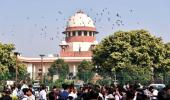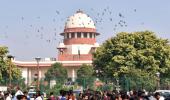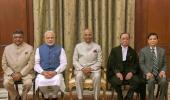Chief Justice of India N V Ramana on Saturday pressed for early clearance of the names recommended by the collegium for appointment as judges in the higher judiciary, saying he is seeking the government's "cooperation and support" to facilitate equal access to justice and to strengthen democracy.

Justice Ramana, who has been actively recommending names for appointment of judges in the higher judiciary after assuming charge as the CJI on April 24, said the collegium has recommended 106 names for high court judges since May and clearing them would take care of pendency of cases to "some extent".
Speaking at an event here, the CJI also noted that the COVID-19 pandemic has "exposed some deep-rooted problems" in the judiciary and underscored the need to ensure equal access to justice, especially to vulnerable sections.
"My companion judges and I have attempted to enable litigants to get faster justice. I want to state that, since May onwards, my team so far has recommended the appointment of 106 judges and nine new chief justices to various high courts.
"The government has cleared seven names out of the 106 judges and one out of the nine for chief justices, so far. I expect that the government will clear the rest of the names very soon. These appointments will take care of pendency to some extent. I seek the cooperation and support of the Government to enable access to justice and to strengthen democracy," he said.
The CJI, who is also the patron-in-chief of the National Legal Services Authority, was speaking at the launch of the six-week-long 'The Pan India Legal Awareness and Outreach Campaign' by NALSA at Vigyan Bhavan that was inaugurated by President Ram Nath Kovind on the occasion of Mahatma Gandhi's birth anniversary.
"For a healthy democracy, a vibrant judiciary is essential. COVID-19 has created many problems for many institutions including the judiciary. Thousands of cases have accumulated in different fora.
"Apart from large vacancies, the non-working of courts and lack of virtual conferencing facilities in rural areas, the pandemic has exposed some deep-rooted problems," the CJI said.
The constitutional guarantee of equal justice will be rendered meaningless if vulnerable sections cannot enforce their rights, the CJI said, adding that sustainable and inclusive growth cannot be achieved without providing "inclusive access to justice" especially to the poor.
The framers of our Constitution were well aware of socio-economic reality and therefore, they envisaged a welfare state where no one is denied basic needs of life, he said.
"In order to protect the aforesaid rights, the framers accorded us all, the equal protection and equality before law. But this guarantee of equal justice will be rendered meaningless if the vulnerable sections cannot enforce their rights," he said.
Equality and "access to justice" complement each other and in countries with major socio-economic gaps, unequal access to justice leads to widening of these divides, he said.
Every person comes across legal issues such as employment, inheritance, business or those related to family, he said, adding "suppression of unmet legal needs results in the suppression of the full potential of an individual".
"In a complex society like ours, which is full of inequities, problems tend to multiply on their own. Loss of daily wage, the prospect of eviction, lack of health care and uncertainty about the next meal- all these flow from the absence of justice. The social costs of this are unimaginable," he said.
Socio-economic justice would be impossible to achieve without providing equal access to justice, he said, adding that all the three organs of the state, the executive, the legislature and the judiciary have come together, to strive for a future based on inclusion, equality and fairness.
"The key to equal access to justice lies in creating legal awareness first. Legal awareness will be the galvansing force behind the reform process that we are propagating. Only when the vulnerable classes are aware about their rights, they can shape their own future," he said.
The people should feel that law and the institutions are for everyone and in a democratic country, it is the faith and trust of the people that sustains institutions, he said.
Faith of the people in constitutional institutions must be earned, he said, adding that the quality of democracy rests on the quality of justice.
He also hailed NALSA for its services since its inception 25 years ago and said that it has helped people in realising their rights and entitlements, all free of cost.
"Empowering and enabling the people is the key to true freedom - freedom from inequity, freedom to dream, freedom to achieve," he said, adding that now the efforts should be turned into a movement and the NALSA should reach to "the remotest corner and to the weakest person in this country".
Speaking at the occasion, Justice UU Lalit, the senior-most judge and executive chairman of NALSA, urged senior lawyers to offer legal aid pro-bono in at least three cases per year as it would instil faith in the legal aid seekers.
Referring to the concept of internship in medical colleges, he said on that line, law students can be asked to offer legal services to the poor in remote parts of the country.
"I am already in touch with the Bar Council of India people and they have assured us that perhaps, I think all law colleges would be extending this kind of support," Justice Lalit said, adding that apart from helping in legal awareness programme, law colleges and students will help NALSA in "reaching the goal and realising our expeditions".
Justice A M Khanwilkar, who heads the Supreme Court Legal Services Committee, also spoke at the event.










